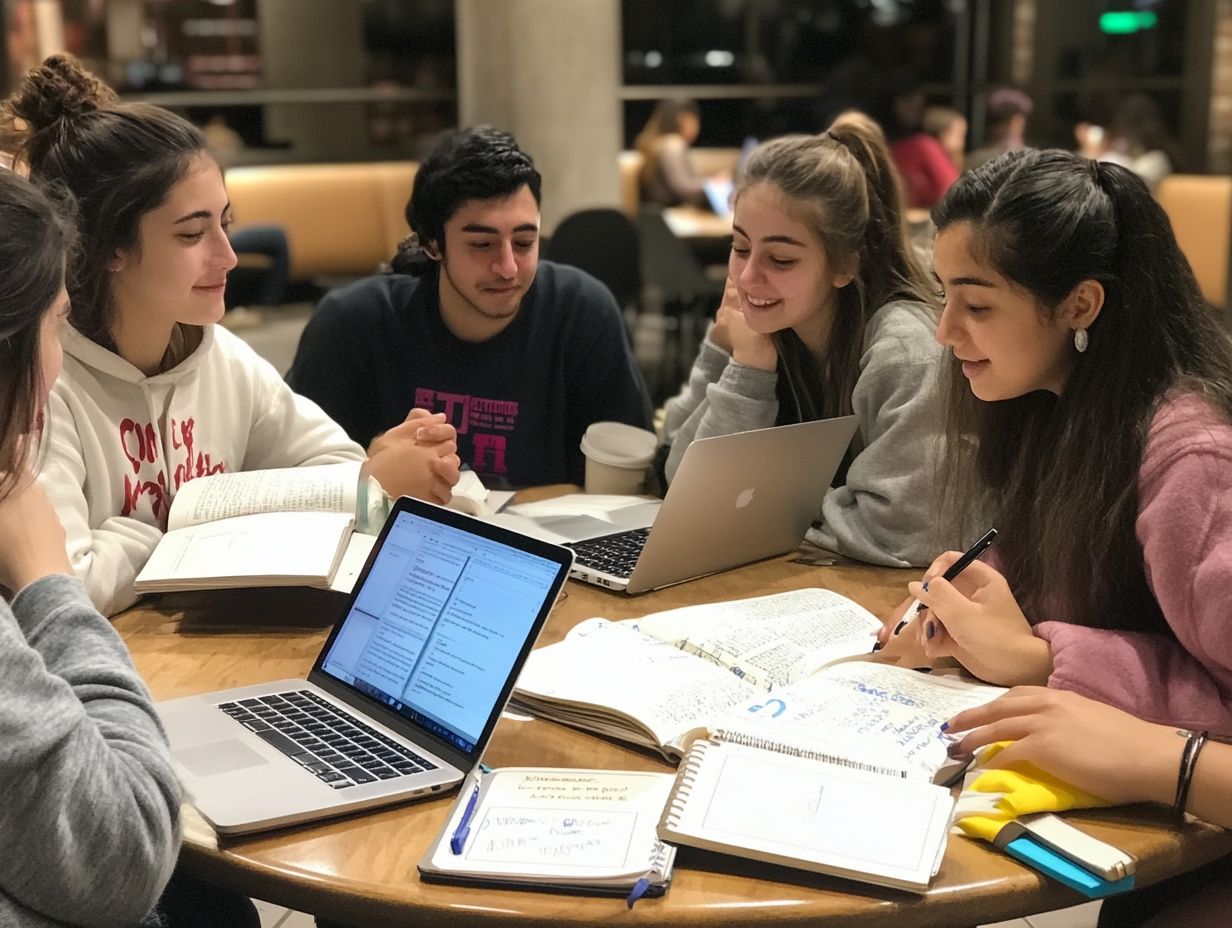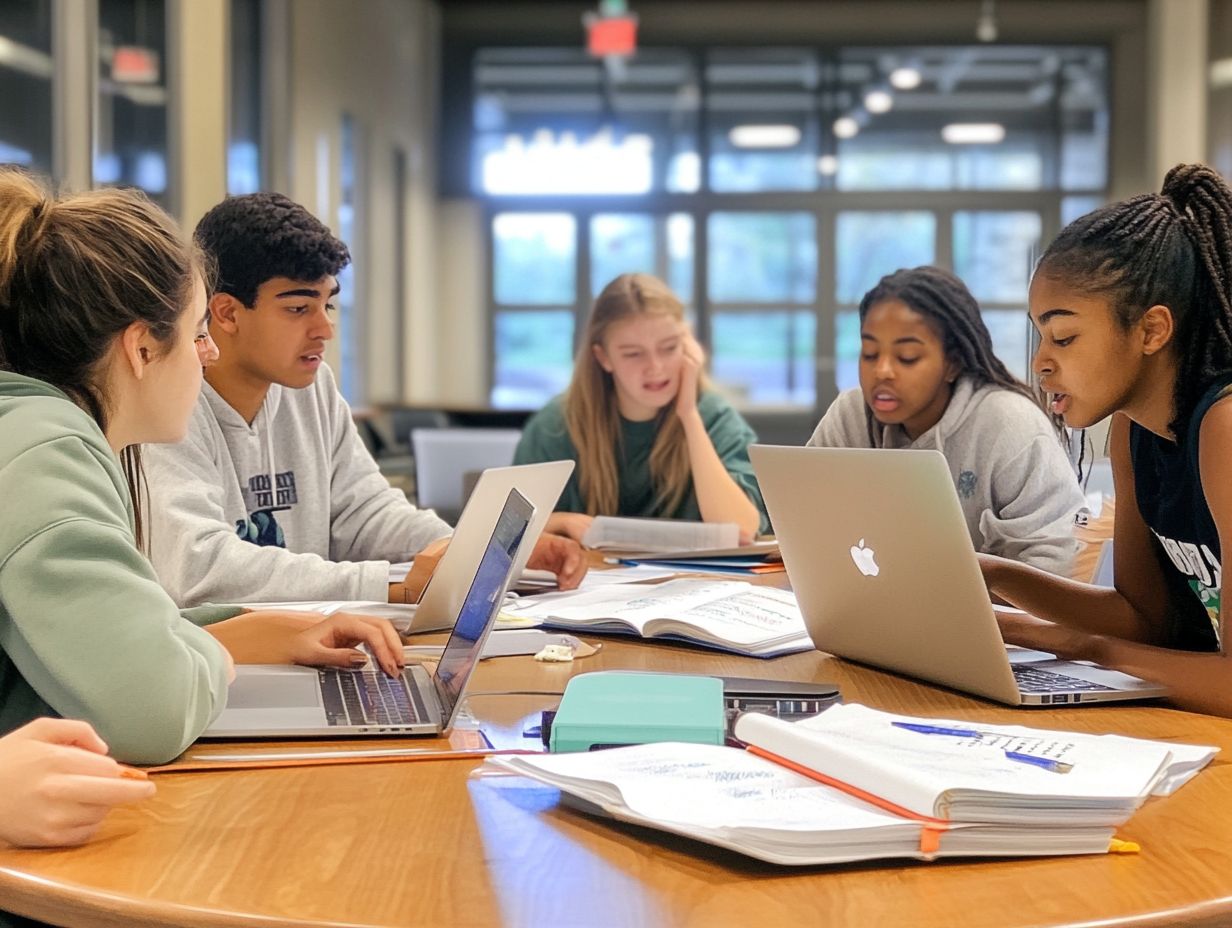the benefits of group study for test preparation
Group study has emerged as a leading strategy for students looking to elevate their test preparation game. Get ready to boost your grades!
By collaborating with peers, you can access a wealth of diverse perspectives and knowledge that will enhance your comprehension and retention. Group study encourages active learning techniques and fosters accountability and motivation among participants.
This article dives into the many benefits of studying in groups, provides practical tips for effective collaboration, highlights common pitfalls to sidestep, and discusses scenarios where individual study might serve you better.
Prepare to unlock the full potential of group study for your academic success!
Contents
- Key Takeaways:
- Why Group Study is Effective for Test Preparation
- How Group Study Can Improve Test Scores
- Tips for Successful Group Study
- Pitfalls to Avoid in Group Study
- Alternative Study Methods
- Final Thoughts on Group Study
- Frequently Asked Questions
- What are the benefits of group study for test preparation?
- How can group study help improve my test scores?
- Are there any specific strategies for group study that can be beneficial for test preparation?
- Can group study be helpful for all types of learners?
- Is it necessary to have a leader or group guide in a group study?
- Can group study be effective for all types of tests, such as multiple choice or essay exams?
Key Takeaways:

Collaboration in group study allows for a deeper understanding of material and can enhance the ability to think carefully and solve problems. Additionally, exploring the benefits of test preparation highlights how active learning techniques, such as discussing and teaching concepts to others, help improve test scores through reinforcement and retention of knowledge.
Establishing clear goals and roles, effective communication, and addressing conflicts can lead to successful group study sessions.
Why Group Study is Effective for Test Preparation
Group study presents a remarkably effective strategy for preparing for board exams. It gathers students into a vibrant learning environment that boosts engagement, accountability, and emotional support.
During structured study sessions, you can share resources and study materials, engage in collaborative learning, and draw on diverse perspectives to tackle complex topics. This teamwork facilitates effective problem-solving and establishes a support system that alleviates stress and cultivates motivation among study partners.
This collaborative approach greatly boosts your academic success.
How Group Study Can Improve Test Scores
Group study can significantly elevate your test scores by encouraging active engagement and employing effective study techniques tailored to diverse learning styles.
By creating an environment that prioritizes accountability and motivation, you can enhance your exam preparation through shared methods and collaborative efforts.
Engaging in discussions and collaboratively resolving problems allows you to tackle any learning gaps more effectively, leading to a deeper understanding and better retention of the material.
Active Learning Techniques
Active learning techniques, such as visually organizing information and peer feedback, are essential for unlocking the full potential of your group study sessions. These methods encourage you to engage deeply with the material, enhancing both retention and understanding of complex concepts.
When you come together in a collaborative environment, you have the opportunity to explore diverse perspectives and clarify misunderstandings through discussion. Visual organization acts as a powerful tool for grasping how ideas interconnect, often leading to a deeper comprehension of the subject matter.
Peer feedback creates a supportive atmosphere where you can confidently offer your thoughts and questions. This prompts richer conversations and encourages further exploration of the topics at hand.
By incorporating these active learning techniques, you can transform your study sessions into dynamic learning experiences that significantly bolster knowledge retention.
Join a study group today and watch your grades soar!
Accountability and Motivation
Establecer un marco s lido para la motivaci n y la responsabilidad entre tus compa eros de estudio es crucial para lograr el xito acad mico en el estudio en grupo. Al establecer metas claras y mantener un sistema de apoyo robusto, t y tus amigos pueden energizarse mutuamente para mantenerse en el camino y concentrados durante sus sesiones.
Para fortalecer este marco, crea una agenda de estudio detallada que describa temas y hitos espec ficos. Esto aclarar las responsabilidades entre los miembros. Dividir las tareas no solo ayuda a distribuir la carga de trabajo, sino que tambi n permite que cada individuo asuma la responsabilidad de temas particulares, mejorando su compromiso con el xito del grupo.
El apoyo emocional es fundamental. Cuando t y tus compa eros reconocen las luchas de los dem s y celebran los logros, se fomenta un sentido de comunidad que alienta la participaci n continua.
Implementar t cnicas de motivaci n puede revitalizar la atm sfera del grupo. Establecer recompensas colectivas por alcanzar objetivos asegura que todos se mantengan comprometidos y productivos.
Tips for Successful Group Study

Para maximizar la efectividad de tus sesiones de estudio en grupo, implementa estrategias clave que mejoren la colaboraci n.
Comienza por establecer metas claras y definir roles para cada participante. Al delinear responsabilidades y promover una comunicaci n efectiva, tu grupo de estudio puede florecer dentro de una din mica positiva.
Establishing Goals and Roles
Definir una agenda de estudio y roles dentro de tu grupo son pasos cruciales. Esta claridad no solo agiliza el proceso de estudio, sino que tambi n mejora el enfoque y la motivaci n.
Cuando eliges roles que se adaptan a tus habilidades, contribuyes mejor al esfuerzo colectivo del grupo. Reconocer y abordar debilidades crea un ambiente donde los miembros apoyan el crecimiento de los dem s, aumentando el rendimiento individual y grupal.
Al delinear claramente las tareas, los miembros se sienten menos abrumados, lo que permite una atm sfera m s colaborativa.
Estas estrategias no solo elevan el compromiso, sino que tambi n mejoran la retenci n de material. Prep rate para obtener resultados exitosos en ex menes y proyectos!
Effective Communication and Conflict Resolution
La comunicaci n efectiva es esencial para navegar las din micas de grupo. Al implementar estrategias de comunicaci n claras y fomentar una atm sfera de respeto, t y tus compa eros pueden abordar los desacuerdos de manera constructiva.
Una valiosa estrategia es escuchar activamente. Esto significa realmente prestar atenci n a los puntos de vista de los dem s sin interrumpir. Esta pr ctica valida sus ideas y fomenta un di logo abierto.
Si alguien en tu grupo se siente abrumado por el material, reconocer sus preocupaciones y sugerir un descanso puede ayudar a aliviar la tensi n. Establecer bucles de retroalimentaci n, donde los participantes se consultan regularmente sobre su comprensi n, puede aclarar confusiones temprano.
Conflictos comunes, como m todos de estudio diferentes o niveles variados de participaci n, se pueden abordar efectivamente en foros abiertos. Esto permite que los individuos expresen sus perspectivas y encuentren un terreno com n, creando un ambiente de estudio m s inclusivo y productivo.
Pitfalls to Avoid in Group Study
Aunque el estudio en grupo presenta muchas ventajas, es vital ser consciente de errores comunes que podr an socavar la productividad y los resultados de aprendizaje.
Reconocer estas trampas te ayudar a fomentar una colaboraci n efectiva y cultivar un ambiente de estudio ptimo que mejore la experiencia de todos.
Comienza a implementar estas estrategias hoy y observa c mo se transforman tus sesiones de estudio!
Common Mistakes and How to Overcome Them
Common pitfalls in group study, such as distractions and ineffective time management, can greatly impact your learning outcomes. Recognizing these challenges is the first step toward adopting effective study methods that sharpen focus and bridge learning gaps.
To keep everyone on point, establish clear objectives and a structured agenda for each session. This way, everyone knows exactly what to concentrate on. Designating a timekeeper can also be beneficial, as it helps manage time allocation for each topic and curtails protracted discussions on off-topic subjects.
Using timers for each segment not only encourages accountability but also fosters active participation among group members. By implementing these strategies, you can create a better study space where everyone stays engaged and effectively absorbs the material, ultimately enhancing academic performance.
Alternative Study Methods

While group study presents a wealth of advantages, it s essential to acknowledge alternative study methods that might align more closely with your individual learning preferences or specific subjects.
Recognizing when group study may not be the optimal choice can markedly elevate your academic performance.
When Group Study May Not Be the Best Option
There are times when group study might not serve you best, especially if you have unique learning styles and personal preferences. Understanding these nuances can guide you in selecting study techniques tailored to your individual needs.
For example, when diving into complex subjects like advanced mathematics or intricate scientific concepts, solitary study often provides a deeper understanding and a more thorough opportunity to absorb the material. In such instances, engaging with the content at your own pace allows you to revisit challenging topics and reflect on your understanding without the distractions that group settings can bring.
Focused revision sessions can significantly boost your memory retention, particularly when you re gearing up for an important exam. Recognizing your own learning style be it visual, auditory, or kinesthetic plays a crucial role in determining the most effective study environment, ensuring you can truly maximize your potential.
Final Thoughts on Group Study
Group study serves as an invaluable tool for you, empowering you to refine your study skills for academic success.
By grasping the dynamics of effective group collaboration, you can harness the collective strengths of your peers to elevate your learning outcomes. This approach not only cultivates a supportive environment but also invites the sharing of diverse perspectives, enriching your understanding of complex subjects.
As you engage with differing viewpoints, you develop critical thinking and problem-solving skills essential for academic excellence.
By using strategies such as setting clear objectives, assigning roles, and fostering open communication, you can significantly enhance the effectiveness of your study sessions.
Ultimately, by applying these techniques, you position yourself to harness the power of group synergy, paving the way for higher performance and a more enriching educational experience.
Frequently Asked Questions
What are the benefits of group study for test preparation?
Group study allows for collaboration and a shared exchange of knowledge and ideas between students. This can lead to a deeper understanding of the subject material and can help fill in any gaps in understanding that an individual may have.
How can group study help improve my test scores?

Group study can help improve test scores by providing the opportunity for students to discuss and work through difficult concepts together. Additionally, understanding the role of study groups in test preparation can enhance accountability and motivation to study.
Are there any specific strategies for group study that can be beneficial for test preparation?
Yes, some effective strategies for group study include dividing up study material and teaching it to each other, practicing with mock quizzes or tests, and creating study guides together.
Don t wait start implementing these strategies today!
Can group study be helpful for all types of learners?
Yes, group study can benefit all learners. It helps visual, auditory, and kinesthetic learners retain information effectively.
Is it necessary to have a leader or group guide in a group study?
Having a group leader can keep everyone organized. It s not essential, though, as long as all members actively engage.
Can group study be effective for all types of tests, such as multiple choice or essay exams?
Yes, group study works well for various tests. For multiple choice exams, discussing answers deepens understanding, while for essays, it allows for valuable peer feedback. Exploring using study groups: pros and cons can help you decide if this technique is right for you.






